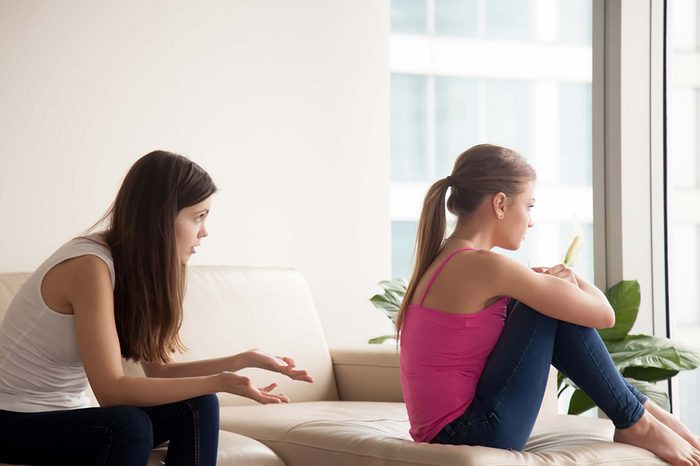
Broken promises
Friends are crucial for our physical and mental well-being but these relationships aren’t always smooth sailing. In fact, it’s common to experience some serious hurt from your friends and a major way this happens is through broken promises, says Jan Yager, PhD, friendship coach, sociologist, and author of When Friendship Hurts and Friendshifts. Perhaps he canceled plans at the last minute or she declined to attend an important party. But while it may sting, the first thing to do is remember that no one is perfect, she says. “If you bring a fantasy about what the ideal friend will do in any situation to a relationship, you are setting yourself up for disappointment,” says Dr. Yager. She has an example from her own life: “When my dad passed away, a friend didn’t go to the funeral. Rather than fume, pull away and be angry, I decided to casually ask her why. I said, ‘I was surprised not to see you at my dad’s funeral. It’s OK, I’m just curious.'” Turns out that her friend’s dad recently passed away too and she just couldn’t handle another funeral. “Never in a million years would I have guessed what was going on.” Not sure what makes a good friend? These are the eight types of friends every woman needs in her life.

When things feel unbalanced
It’s common for relationships to experience periods where things are unbalanced. Maybe one friend is going through a breakup and needs extra support or perhaps it’s possible another friend simply has more to discuss at any given time. This is why it’s so important to ask for what you need, even if it puts you in a vulnerable situation, says Leslie Jay, LMHC, a professional counselor. “Try saying ‘I’m happy to be able to hear what you’re going through. Sometimes I need to talk. Could you listen to my problems?’ or ‘I noticed I’m always sharing about my life. I want you to tell me something about your life,'” she suggests. To make sure you’re giving as much to your friends as you’re getting, practice these 9 skills for becoming a better listener.

Being ghosted
Have a friend disappear on you is tough, especially if you felt close or if the connection seemed promising. Maybe after a fun night out, your friend didn’t reply to messages or left an email unanswered. If you linger on the heartache of being ghosted for too long, we can start to feel resentful and angry, says Dr. Yager. “The basic thing about friendship that’s so important to remember is that it’s optional,” she continues. This goes for both parties. We choose others and others choose us. The challenge is to not to label your self “unchosen” and miss out on meeting new friends or cultivating deeper relationships with existing pals. Keep in mind that it makes sense to feel pain after being ghosted, so give your self some time. Carlin Flora, social science writer and author of the book Friendfluence, says, “One piece of advice is to stop trying to figure out why. It’s better for your mental health to accept that you really don’t know the reason why. Sometimes, you really don’t know what’s going on with other people.” (Here are some quotes about toxic people that will help you heal.)

Feeling left out
No one likes feeling left out. There’s no worse feeling than when you check Facebook Monday morning to find out that your friends went on a weekend getaway without you. Scott Christnelly, LCSW, a therapist with Talkspace, says, “I encourage clients to express their feelings about it but also not to jump to conclusions.” Then find someone else to talk to—maybe a counselor, a family member, or a close friend (not one who went on the trip)—to explain how you feel. Maybe through that conversation, you can brainstorm what might have happened and how you will respond. In the meantime, take care of your own needs with these 50 science-backed tips for beating loneliness.

Scheduling conflicts
These days, with packed calendars and competing obligations, rescheduling plans with friends is all too common. Arranging hangouts with pals can take weeks of back-and-forth. Jay explains that direct communication is key to overcoming this hurdle. Say, “I really want to see you this week. I know we’re both busy, but how about XYZ?” Direct communication can leave you feeling vulnerable, she says, “but the reward always outweighs the risk.” These 22 heartwarming stories of true friendship will remind you just how important it is to make time for friends.

Experiencing envy
Maybe you’re still single and your BFF is married. Maybe your best pal is traveling the world and you’re broke, stuck in a cubicle, paying off student loans. Even though you love your friends, you can end up feeling jealous of them. Before this happens, use the envy to your advantage. Sometimes jealousy reveals our deepest desires, says Dr. Yager. Healthy envy can motivate you to become better and be inspired by your friend’s success, she says. She points out that it could be the other way around as well: Your friends might be jealous of you. Either way, Dr. Yager says, “Self-talk can help. Remind yourself of what you do have and that your jealousy is only a temporary feeling that now that you’re aware of, you’re going to work to not let it ruin your friendship.” Envy isn’t all bad. Here’s how to make jealousy work for you.

A friend breakup
Breaking up with a close friend can be one of the hardest types of breakups to deal with, Flora says. “We don’t talk about the trauma of losing a friend,” she says. What makes grief worse is that you may not feel permission to mourn the loss in the same way you would separating from your partner. “Imagine someone telling their boss that they need to take a day off work because they had a falling out with a friend. It would be seen as bizarre. Now, imagine what would happen if someone asked to take a personal day after a divorce. The boss will say sure,” she explains. Friend breakups can be just as traumatic as a romantic split or family estrangement, and it’s important to honor that pain. “Acknowledgement is big,” says Flora. “Acknowledge that friendship is beautiful and rewarding and that its loss is significant.” Sometimes a breakup, while painful, is for the best—make sure you know the 9 clear signs you’re in a toxic friendship.

Missing someone a little too much
It’s easy to look back on the friendships of youth with longing but if you’re always looking back, you’ll have a tough time getting new relationships to live up to rosy memories. As you encounter new friends, look for common core beliefs, such as a value for creativity or spirituality. “Shared values are the best predictor of longevity in a friendship,” Dr. Yager says. Not only can shared values potentially make a friendship last, but they will influence your well-being in powerful ways. In her book Friendfluence, Flora writes, “Friendships subtly steer our beliefs, our values, and even our physical and emotional health. Although resolutions to enact new diet and exercise plans and vows to change our character are all too easy to break, if we befriend people whose philosophies and habits we admire, we naturally start adopting aspects of their personalities and lifestyles through a positive desire to be with and to be like our friends.” Grab a buddy and have a laugh at these funny quotes about friendship.

You’re bored
If your problem is that you feel the friendship is stuck in a rut, breaking out of this “blah” pattern might take work. “Kick the friendship up a notch with new experiences,” Dr. Yager says. “You can try adding new people to the friendship. If you and your friend always go for coffee, ask one or more new friends to join you. If it’s two couples that always get together, try meeting your friend alone so you can bond in different ways. Go to the movies or take in a show. Take a cooking class together or start a book club.” If even chatting has gotten boring, these riveting conversation starters will help get it flowing.

Not feeling like a priority
Remember that all relationships ebb and flow so before you jump to any conclusions, take time to think through all the possibilities, Dr. Yager says. “There can be work, family, romantic relationship, or even other friendship challenges that your friend is dealing with that have nothing to do with you,” she says. “Try to find out what’s going on in your friend’s life that might be causing her to pull away. If your friend is really not responding to you because of you or the friendship, see if you can figure out what’s bothering her.” If you’re not careful, you can damage your friendship, like these nine ways that paranoia can ruin your relationships.

Growing apart
It’s a sad fact of life: Many friends end up simply growing apart. For instance, when one friend moves on from a “partying stage” during emerging adulthood and no longer has much in common with a former drinking partner. Jay often sees clients who are navigating friendships that are no longer healthy for them. She says the friend who is moving forward can experience guilt and shame for leaving the other behind. The key, Jay explains, is letting friends play roles in your life. Don’t expect too much from any one friend. When you feel ready for a wild night out, call that friend up. “Let people be a certain puzzle piece rather than an entire puzzle,” Jay says. You don’t have to grow apart, however. Use these 14 secrets to make and keep lifelong friendships.

Not enough “IRL” friends
Spending a ton of time on social media can leave you feeling like you have hundreds of friends, yet when you want to grab a coffee or see a movie, there’s no one there. We all need real-life pals and you can’t rely on social media for connection, Dr. Yeager says. One way to bond offline is to set up a structured meeting—a walking crew or book group—that meets regularly. When Flora became a mother, she joined a group of local women with new babies who met regularly in her neighborhood. An organized group can provide guaranteed face time with friends to build on your relationship. The bottom line is that you need to make time to be with friends. Flora writes: “If we understood how beneficial real friends are, I think we’d be less passive and more careful about how we treat them.” Not convinced? Here’s exactly how your social media habits are hurting your relationships.

